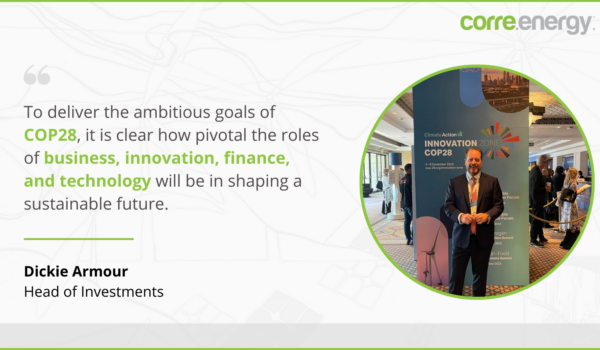
Written by: Dickie Armour
COP28 marks a critical juncture in global efforts to address climate change. To deliver the ambitious goals of the event, it is clear how pivotal the roles of business, innovation, finance, and technology will be in shaping a sustainable future.
Businesses, both large corporations and small enterprises, are key players in the transition to a low-carbon economy. They wield the power to influence and drive change across industries. Through adopting sustainable practices, reducing carbon footprints, and investing in green technologies, businesses can contribute significantly to achieving COP28 objectives. Embracing circular economy principles, sustainable supply chains, and responsible production processes will not only benefit the environment but also enhance corporate reputation and market competitiveness.
Innovation stands as a cornerstone for achieving the targets outlined in COP28. It is only through continuous advancements in technology, processes, and business models that societies can reduce greenhouse gas emissions and adapt to the challenges posed by climate change. Innovations in renewable energy, carbon capture technologies, and sustainable agriculture are vital components of the global effort to mitigate climate change. Additionally, breakthroughs in energy storage technologies, such as compressed air energy storage (CAES), hold tremendous promise for balancing intermittent renewable energy sources and ensuring a stable and reliable energy supply.
Financing sustainable initiatives is crucial to their success and widespread adoption. Governments, financial institutions, and private investors must allocate resources to projects that align with COP28 goals. The financial sector can play a pivotal role in steering capital towards environmentally friendly projects, fostering the growth of green industries, and incentivising sustainable practices. Moreover, creating financial mechanisms, such as green bonds and sustainable investment funds, can and should attract investment into projects that address climate change and contribute to a more resilient future.
The success of COP28 hinges on a collaborative effort that involves businesses, innovators, financiers, and technological advancements. By recognising the dependencies of these elements, nations can accelerate progress toward a sustainable and resilient future. Businesses must embrace sustainable practices, innovation must drive the development of green technologies, and finance must be directed towards projects that align with COP28 objectives. Investing in transformative technologies, such as compressed air energy storage, will be instrumental in overcoming the challenges of integrating renewable energy sources into the grid. Together, these pillars can pave the way for a future where economic growth aligns seamlessly with environmental stewardship, delivering on the promises set out by COP28.

